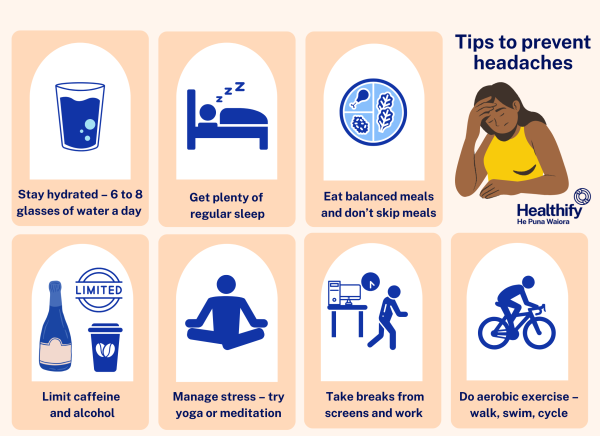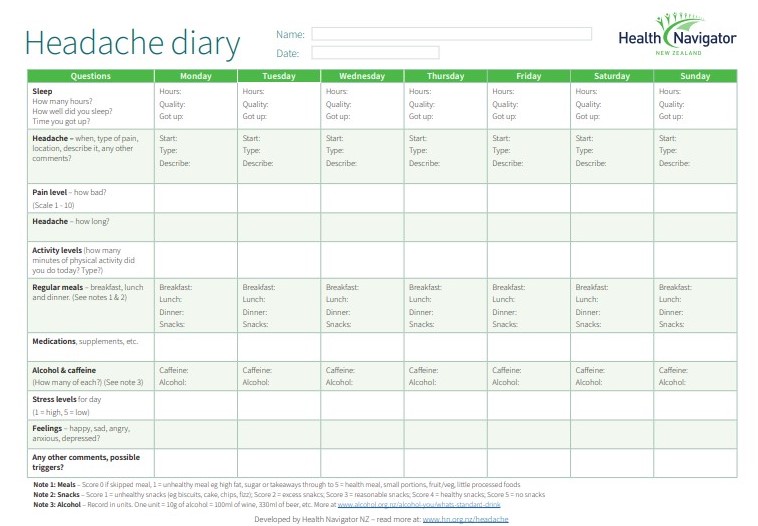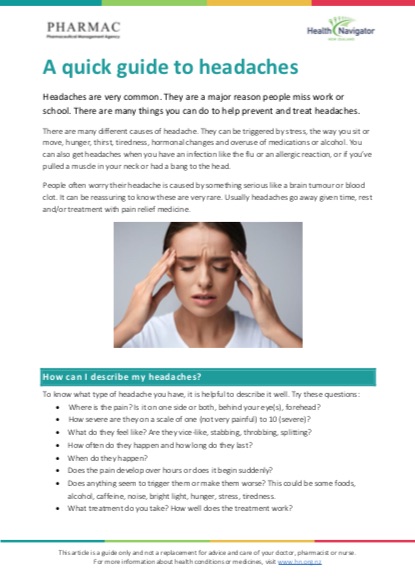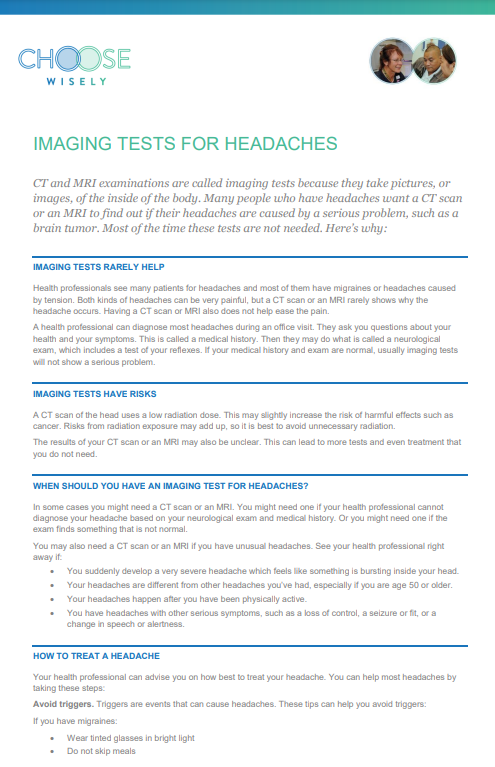You can now add Healthify as a preferred source on Google. Click here to see us when you search Google.
Headache – overview
Key points about headaches
- Headaches are one of the most common health problems, most people get them at some point.
- Most headaches can be managed at home with rest, hydration and good lifestyle habits.
- While most headaches aren't serious, frequent or severe headaches can interfere with your daily life.
- If you often get headaches, or they're disabling, it's important to talk to your healthcare provider.

A headache is when you have pain in your head. Headaches are one of the most common health problems and most people will get them at some point. They're not generally anything to worry about but they can disrupt your daily life.
If your headaches are severe or go on a long time talk to your healthcare provider.
There are 2 main types of headaches:
- Primary headaches which are caused by changes in your brain or nerves rather than by another illness. They include tension headaches, migraines and cluster headaches.
- Secondary headaches which are caused by another medical problem, such as infection, sinus issues, head injury, or high blood pressure.
Read more about the different types of headache below.
Most headaches can be managed safely at home with rest, hydration, and good habits. However, new treatments and digital tools are changing how headaches are understood and treated – talk to your healthcare provider if you have frequent or disabling headaches.
Understanding headaches: What causes them and what to do
Tension headache
- Feels like a tight band or dull pressure around your head or behind your eyes.
- May start with neck or shoulder tension and may get worse as the day goes on.
- Often linked to stress, poor posture, or tiredness.
What helps: Rest, gentle stretching, relaxation, staying hydrated, and limiting caffeine.
Read more about tension headaches.
Migraine
- Usually one-sided, throbbing, and can last hours to days.
- Often comes with nausea (feeling sick), vomiting (being sick), and sensitivity to light or sound.
- Some people notice a warning 'aura' – flashing lights, zig-zag patterns, dizziness, or tingling.
- Triggers include hormone changes, lack of sleep, missed meals, bright lights, stress, alcohol, or certain foods.
What helps: Rest in a dark room, hydration, early treatment with prescribed medicine.
Read more about migraines.
Cluster headaches
- Very severe, one-sided pain (usually around the eye), often at night.
- May cause a red, teary eye, blocked nose, or sweating on one side.
- Occurs in 'clusters' – daily for weeks, then disappears for months.
What helps: See your healthcare provider urgently. Oxygen and specific migraine medicines can relieve attacks.
Read more about cluster headaches.
Medication overuse headache
- Occurs when painkillers are taken too often.
- Feels like a dull, daily headache that improves only briefly after taking medication.
Tip: Use simple pain relief (like paracetamol or ibuprofen) only when needed – ideally fewer than 10 to 15 days per month.
If this sounds like you, see your healthcare provider for help with safely stopping pain medication. Read more about medication overuse headaches(external link).
Post-traumatic headache
- Common after a concussion or mild head injury.
- Can last for weeks or months but usually improves with time, rest, and good sleep.
Read more about concussion and head injury.
Apps
- Mobile apps can now help to recognise headache triggers, monitor symptoms and track how well treatments are working.
- Smart watches can record stress and sleep data to support headache tracking.
Apps reviewed by Healthify
You may be interested in some migraine and headache apps.
The treatment of your headache will depend on the cause and will vary depending on the specific type of headache. Here are a few general things you can do.
- Drink a large glass of water as you may be dehydrated.
- Take pain relief medication:
- paracetamol, aspirin or ibuprofen are simple pain relievers (analgesics) that can ease occasional tension headaches
- if pain relief is taken soon enough, it can help stop migraine. Read more about migraine medicines.
- Rest in a dark, quiet room.
- Have someone give you a head, neck and shoulder massage.
- Relax in a warm bath.
If you keep getting headaches or migraines, track them with a headache diary to help you look for triggers or patterns. This can also be useful to show your healthcare provider.
- a sudden, very severe ('worst ever') headache.
- a headache with blurred vision, confusion, fever, or neck stiffness
- a headache after a head injury, or with vomiting or weakness
- a headache that gets worse with coughing or exertion.
See your healthcare provider if:
- You have headaches more than 3 times a month.
- You need painkillers more than twice a week.
- Your headaches are changing or getting worse.
- You’re over 50 years of age and have new or persistent headaches.
Your healthcare provider will ask about your symptoms, triggers, and medical history. Scans (CT or MRI) are only needed if something serious is suspected – most people don’t require imaging.
To help your healthcare provider
- Keep a headache diary – record when headaches happen, how they feel, what you ate, how you slept, and what helped.
Some of the things to think about are listed below.
- Where is the pain? Is it on one side or both, behind your eye(s), forehead.
- How severe are they? You can describe how severe your pain is using on a scale of 1 to 10. See ways to describe pain.
- What do they feel like? Is it vice-like, stabbing, throbbing, splitting.
- How long do they last? This could be minutes, hours or days.
- How often do they occur? Are they daily, monthly, only at certain times of the day, only on weekends or weekdays?
- When do they occur? Is it on waking, in the afternoon or at work?
- How do they start? Does the pain develop over hours or does it begin suddenly?
- When did you start getting headaches? Was it childhood, adolescence or middle age?
- What triggers them? This could be some foods, alcohol, caffeine, exertion, noise, bright light, hunger, stress, tiredness, weather.
- What else do you feel? This may include neck or shoulder tension, sinus pain, tender scalp, jaw pain, being sick (nausea or vomiting).
- Is your vision affected? For example do you have blind spots, strange lights or patterns?
- What treatment do you take?
- How effective was the treatment?
- Stay hydrated – aim for at least 6 to 8 glasses of water a day.
- Get regular sleep – try to go to bed and wake up at the same time daily.
- Eat balanced meals – don’t skip meals.
- Limit caffeine and alcohol.
- Manage stress – gentle exercise, meditation, or yoga help.
- Take breaks – especially from screens or long work hours.
- Exercise – regular aerobic exercise, such as walking, swimming, or cycling, can reduce headaches by up to 30 to 40%.

Image credit: Healthify He Puna Waiora
Headache(external link) Health New Zealand | Te Whatu Ora
Range of migraine and headache topics(external link) American Migraine Foundation, US
Brochures
Headache diary [PDF, 102 KB] Healthify He Puna Waiora, NZ, 2021
A quick guide to headaches [PDF, 317 KB] Healthify He Puna Wairoa, NZ and PHARMAC, 2018
Did you know 1 in 7 people have migraine?(external link) Migraine Foundation Aotearoa New Zealand, 2025
Apps
References
- Diagnosing and managing headache in adult in primary care(external link) BPAC, NZ, 2017
- Headache in primary care(external link) BPAC, NZ, 2007
- Medication – overuse headache(external link) Migraine Foundation Aotearoa New Zealand, 2022
See our page Headache for healthcare providers
Brochures

Healthify He Puna Waiora, NZ, 2021

Healthify He Puna Waiora, NZ and PHARMAC, 2018

Choosing Wisely, NZ, 2016
Credits: Healthify editorial team. Healthify is brought to you by Health Navigator Charitable Trust.
Reviewed by: Dr Ray Bose, Consultant Neurologist, Auckland
Last reviewed:





